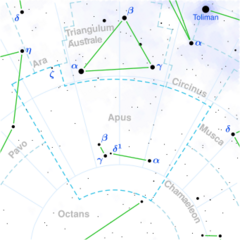Astronomy:Kappa2 Apodis
| Observation data Equinox J2000.0]] (ICRS) | |
|---|---|
| Constellation | Apus[1] |
| Right ascension | 15h 40m 21.355s[2] |
| Declination | −73° 26′ 48.00″[2] |
| Apparent magnitude (V) | 5.65[3] |
| Characteristics | |
| Spectral type | B7 III-IV + K0 V[4] |
| U−B color index | –0.38[3] |
| B−V color index | –0.04[3] |
| Astrometry | |
| Radial velocity (Rv) | −19.0[5] km/s |
| Proper motion (μ) | RA: −15.517[2] mas/yr Dec.: −26.408[2] mas/yr |
| Parallax (π) | 4.5583 ± 0.0823[2] mas |
| Distance | 720 ± 10 ly (219 ± 4 pc) |
| Absolute magnitude (MV) | −1.24[1] + 6.50[6] |
| Details | |
| κ2 Aps A | |
| Mass | 4.995±0.250[7] M☉ |
| Radius | 5.555±0.278[7] R☉ |
| Luminosity | 316[8] L☉ |
| Surface gravity (log g) | 3.86[8] cgs |
| Temperature | 12,646[8] K |
| Age | 130[8] Myr |
| κ2 Aps C[8] | |
| Luminosity | 0.25[6] L☉ |
| Temperature | 5,127[6] K |
| Other designations | |
| Database references | |
| SIMBAD | data |
Kappa2 Apodis is a double star in the southern circumpolar constellation of Apus. Its identifier is a Bayer designation that is Latinized from κ2 Apodis, and abbreviated Kap2 Aps or κ2 Aps, respectively. This star is located at a distance of approximately 720 light-years (220 parsecs) from Earth, based upon parallax measurements with a 1.4% margin of error.[2] They are approaching the Sun with a radial velocity of −19 km/s.[5] The pair have a combined apparent visual magnitude of +5.65,[3] which makes the system faintly visible to the naked eye.
The brighter star, designated κ2 Aps A, has a stellar classification of B7 III-IV, with the luminosity class of III-IV suggesting that it may lie in an intermediate stage between a subgiant and a giant star.[10] Based on observations with TESS, it is a pulsating B star of the Maia type.[11] This star is about 130[8] million years old with an estimated 5 times the mass and 5.6 times the radius of the Sun.[7] It is radiating 316[8] times the luminosity of the Sun from its photosphere at an effective temperature of 12,646 K.[8]
A faint companion, κ2 Aps C,[8] is a K-type main sequence star with a classification of K0 V. It has a visual magnitude of 12.5 and an angular separation of 15 arcseconds from the brighter member.[4] The pair have a projected separation of around 2,520 au.[6]
References
- ↑ 1.0 1.1 Anderson, E.; Francis, Ch. (2012), "XHIP: An extended hipparcos compilation", Astronomy Letters 38 (5): 331, doi:10.1134/S1063773712050015, Bibcode: 2012AstL...38..331A.
- ↑ 2.0 2.1 2.2 2.3 2.4 Vallenari, A. et al. (2022). "Gaia Data Release 3. Summary of the content and survey properties". Astronomy & Astrophysics. doi:10.1051/0004-6361/202243940 Gaia DR3 record for this source at VizieR.
- ↑ 3.0 3.1 3.2 3.3 Johnson, H. L. et al. (1966), "UBVRIJKL photometry of the bright stars", Communications of the Lunar and Planetary Laboratory 4 (99): 99, Bibcode: 1966CoLPL...4...99J.
- ↑ 4.0 4.1 Eggleton, P. P.; Tokovinin, A. A. (September 2008), "A catalogue of multiplicity among bright stellar systems", Monthly Notices of the Royal Astronomical Society 389 (2): 869–879, doi:10.1111/j.1365-2966.2008.13596.x, Bibcode: 2008MNRAS.389..869E.
- ↑ 5.0 5.1 Wilson, Ralph Elmer (1953), "General Catalogue of Stellar Radial Velocities", Carnegie Institute Washington D.C. Publication (Washington: Carnegie Institution of Washington), Bibcode: 1953GCRV..C......0W.
- ↑ 6.0 6.1 6.2 6.3 Lindroos, K. P. (May 1985), "A study of visual double stars with early type primaries. IV. Astrophysical data", Astronomy and Astrophysics 60: 183–221, Bibcode: 1985A&AS...60..183L.
- ↑ 7.0 7.1 7.2 Kervella, Pierre et al. (March 2019), "Stellar and substellar companions of nearby stars from Gaia DR2. Binarity from proper motion anomaly", Astronomy & Astrophysics 623: 23, doi:10.1051/0004-6361/201834371, A72, Bibcode: 2019A&A...623A..72K.
- ↑ 8.0 8.1 8.2 8.3 8.4 8.5 8.6 8.7 8.8 Gerbaldi, M. et al. (2001), "Binary systems with post-T Tauri secondaries", Astronomy & Astrophysics 379 (1): 162–184, doi:10.1051/0004-6361:20011298, ISSN 0004-6361, Bibcode: 2001A&A...379..162G.
- ↑ "HR 5782". SIMBAD. Centre de données astronomiques de Strasbourg. http://simbad.u-strasbg.fr/simbad/sim-basic?Ident=HR+5782.
- ↑ Houk, Nancy (1978), Michigan catalogue of two-dimensional spectral types for the HD stars, 1, Ann Arbor: Dept. of Astronomy, University of Michigan, Bibcode: 1975mcts.book.....H.
- ↑ Balona, L. A.; Ozuyar, D. (2020), "Pulsation among TESS a and B stars and the Maia variables", Monthly Notices of the Royal Astronomical Society 493 (4): 5871, doi:10.1093/mnras/staa670, Bibcode: 2020MNRAS.493.5871B.
External links
 |

